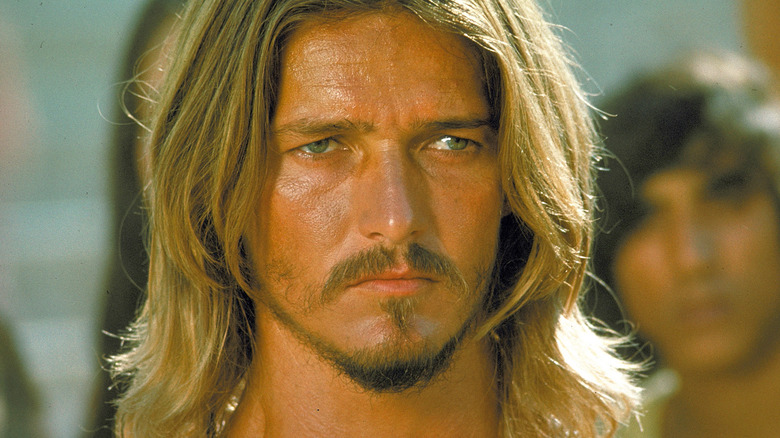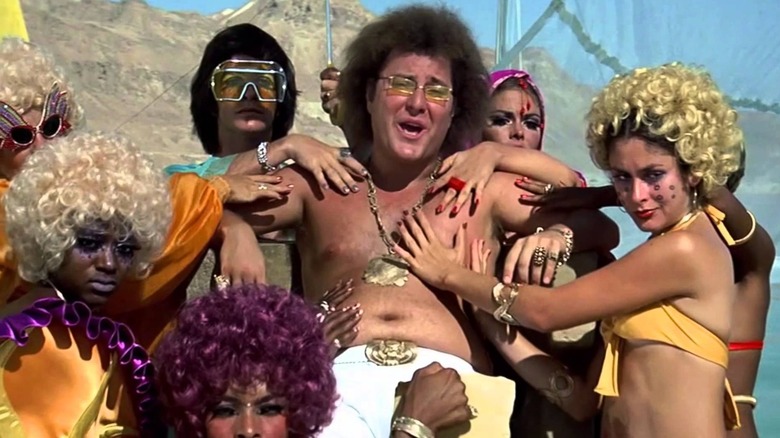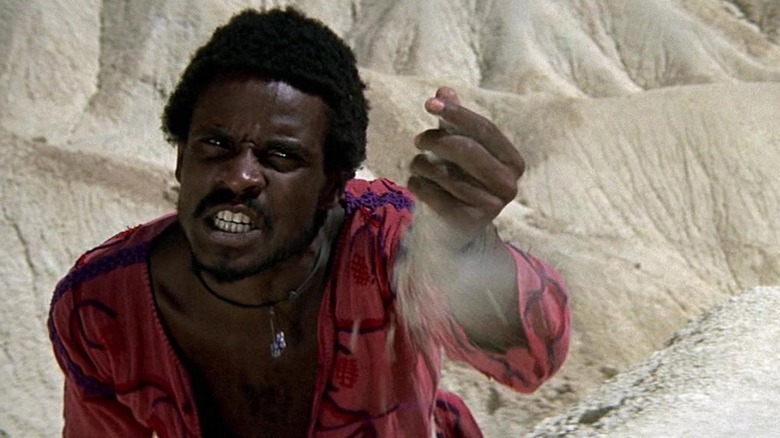Jesus Christ Superstar: From Blasphemous To Badass
It's a lot more common in 2022 to grow up in a completely secular household, but as a child who grew up in the Midwest during the '90s, my family of non-church attending heathens were in the minority. Every year as my friends and classmates prepared for the three day weekend full of religious traditions surrounding Easter, I was more preoccupied with watching "It's the Easter Beagle, Charlie Brown" and lamenting over Marcie's inability to boil eggs, or belting my face off to my family's chagrin to Andrew Lloyd Webber and Tim Rice's rock 'n roll masterpiece, "Jesus Christ Superstar."
My parents grew up as tried and true rock music fanatics, which meant that the concept album that was released as a means to fund the eventual Broadway production was a staple for my budding theatre kid self. For many years, "Jesus Christ Superstar," in my mind, was nothing more than another banging soundtrack to a Broadway show I was convinced I would never get the chance to see. Imagine my euphoria when I discovered that a movie version from 1973 had existed the entire time.
Directed by Academy Award-nominated Norman Jewison ("Fiddler on the Roof," "Moonstruck," "The Hurricane") and adapted from the rock-opera of the same name, "Jesus Christ Superstar" tells the story of the last days of Jesus Christ (Ted Neeley) through the eyes of his betrayer, Judas Iscariot (Carl Anderson). As time goes on, Jesus' popularity grows, and Judas is concerned that the so-called prophet is beginning to forget the messaging of his own teachings in favor of reveling in his newfound fame and popularity, while simultaneously getting a little too close for comfort with the supposed sex worker Mary Magdalene (Yvonne Elliman).
Most people rejected his message
"Jesus Christ Superstar" is in no way supposed to be an accurate retelling of biblical texts, instead using the commonly known story of Jesus as a metaphor for the pitfalls of celebrity, and the importance of seeing all people for the human beings they are. The show's central message is that there's danger to putting someone up on a pedestal — whether they be famous musicians, politicians, or the alleged son of God.
When "JCS” debuted on stage in 1971, the show sparked massive controversy. Christian religious groups called it "blasphemous," Jews called it antisemitic, and political conservatives found the stylized nature of the music "too radical." The show was banned in Hungary and South Africa upon release, but in the 50 years since it first hit the stage, cultural progress and an increased understanding of media literacy has all but washed these controversies away.
Andrew Lloyd Webber and Tim Rice intentionally left out the parables and Christian doctrine typically found in religious musicals (I'm looking at you, "Godspell"), declaring the show as theologically neutral. I believe them. This isn't the story of Jesus Christ, the religious figure and alleged savior of the people: This is the story of a superstar. His sympathetic victimhood comes not at the cost of his sacrificial destiny, the way a film like "The Passion of the Christ" chose to portray. Instead, Jesus Christ is characterized like Elvis Presley or one of the Beatles, with his growing number of followers more closely resembling a rabid fanbase than a set of disciples. "What's the Buzz/Strange Thing, Mystifying" plays less like the gospel and more like the deranged demands made by fans during a pop star's livestream.
The music is Andrew Lloyd Webber's best
Hot take for lovers of "Cats," "Phantom of the Opera," "Evita," "Joseph and the Amazing Technicolor Dreamcoat," and that one person out there who's ride-or-die for "Starlight Express," but "Jesus Christ Superstar" is Andrew Lloyd Webber at his very best, and it's not even close. The music of "JCS" is a brilliant marriage of '70s butt rock with musical theater sensibilities.
Carl Anderson's opening of the film with "Heaven on their Minds" is an agonizing plea of desperation from Judas, and Anderson's voice is dripping with gruff emotional anguish. Mary Magdalene's ballad "I Don't Know How to Love Him" swept the country, with both a version by Helen Reddy and the film/album version by Yvonne Elliman landing on the Billboard Top 40 at the same time. The guitar riffs in "Damned For All Time/Blood Money" are just begging to be played by Jimi Hendrix, and Anderson's voice is once again out of this f****** world.
Everything from the campy and flamboyant "King Herod's Song" and the pure musical theatre cheese of the titular theme "Jesus Christ Superstar" fit exactly as they should, but the brooding rock anthem "Gethsemane (I Only Want To Say)" is perhaps the best piece of music ever written by both Andrew Lloyd Webber and Tim Rice. Ian Gillan of Deep Purple famously improvised a wailing high G during Jesus' plea of "Why should I die?" and while it's perfectly acceptable for vocalists to still perform the role as written and foregoing the high note, it's also become part of the appeal of the character. Ted Neeley throws his entire soul into his rendition of the song, and hearing someone nail that note live is probably the closest thing we'll ever get to hearing the voice of God.
I personally don't believe in any form of God, but I do worship at the altar of Ian Gillan and Ted Neeley (and Ben Forster, Steve Balsamo, Heath Saunders, Billy Porter, Vaclav Noid Barta, Aaron La Vigne, Camilo Sesto, Glenn Carter, Jodie Steele.) Even Caiaphas, the man who supposedly orchestrated the killing of the human man of Jesus, knows the truth. "One thing I'll say for him," he sings. "Jesus is cool."
Jesus Christ Superstar changed the game
While "Jesus Christ Superstar" came out during a time of experimental musical theatre like "Hair" and "The Rocky Horror Show," it did something truly extraordinary that changed the landscape of what was possible within the confines of a "musical" — forever. Andrew Lloyd Webber and Tim Rice captured the energy and popular music stylings of a time period and breathed new life into the story of one of the most famous historical figures of all time. In a lot of ways, "JCS" paved the way and set up the possibility for something like Lin-Manuel Miranda's hip-hop-infused history remix, "Hamilton."
Upon release, "Jesus Christ Superstar" was the highest-grossing movie musical of the year and Neeley, Anderson, and Elliman were all nominated for Golden Globe Awards for their performances as Jesus, Judas, and Mary Magdalene. Nearly 50 years later, the film adaptation of the Broadway show is still as captivating as ever, and makes for (in my opinion) a far better Easter tradition than eating chocolate crucifixes.



